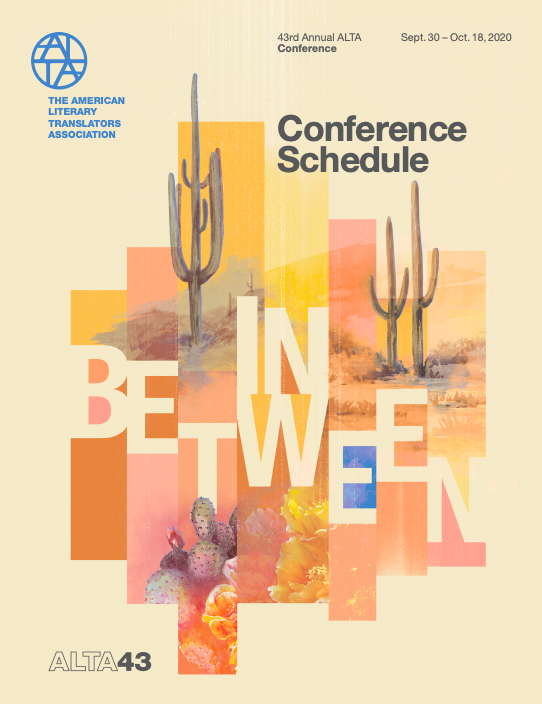The American Literary Translators Association
Read the World
Write the World
ALTA43: In Between
September 30-October 18, 2020
first virtual ALTA conference
#ALTA43
ALTA43 Welcome and programming
Meet the ALTA43 travel fellows
FIRST-TIME ATTENDEES GUIDE
Registration
Accessibility
Special thanks to our ALTA43 partners:
Academic Studies Press
The Academy of American Poets
The American-Scandinavian Foundation
Boston University Literary Translation MFA Program
Bread Loaf Translators' Conference
The Center for Buddhist Studies at the University of Arizona
The Center for Educational Resources in Culture, Language and Literacy (CERCLL) at the University of Arizona
The Center for Middle Eastern Studies at the University of Arizona
Columbia University School of the Arts
Deep Vellum
The Institut Ramon Llull
Kenyon Review Literary Translation Workshop
Laertes
The Library of Arabic Literature
The Massachusetts Review
Milkweed Books
National Capital Area Translators Association (NCATA)
The National Endowment for the Arts
PEN America
Polish Cultural Institute New York
P.R.A. Publishing
Syracuse University Press
Tin House
The Translation Center at the University of Massachusetts Amherst
Zephyr Press
ALTA is committed to equity, diversity, and inclusion in our community and programming and to modeling those values as we support and advocate for translators. We are interested in panels, roundtables, and workshops that explicitly engage with these values, and that support inclusive participation across lines of race, ethnicity, disability, sexual orientation, gender identity, nationality, age, and religion.
We welcome everyone to our conference and are committed to making our programming and events accessible and to making arrangements that allow all attendees to participate in the conversation. Please view our Accessibility web page for more information.
In accordance with ALTA conference policy, we ask that participants not read papers at panels, roundtables, or workshops. Rather, participants prepare talking points and examples based in the practice of literary translation.
Due to the current health crisis, ALTA has shifted to a virtual conference this year. To learn more, please see this statement from ALTA Board President Ellen Elias-Bursać, a statement from ALTA staff about changes to session and reading proposals, and the revised Proposal Guidelines for the Virtual 2020 ALTA Conference.
 Translation is neither here nor there. It exists in a space between languages, cultures, texts, authors, and readers. The ALTA43 theme “In Between” invites participants to consider the ways translation and translators function not as mediators between fixed points—“source text,” “original language,” “target culture”—but rather in a constant state of betweenness. Translation as an in-between practice seeks not to cross borders (whether real or artificial) but to transcend and dissolve them, to show how language, cultures, and texts are never singular and always in process. This theme also resonates with our conference venue of Tucson, Arizona, ALTA’s current home and a territory that reminds us of the continuous shifting and arbitrariness of borders and the power of the nuances of language.
Translation is neither here nor there. It exists in a space between languages, cultures, texts, authors, and readers. The ALTA43 theme “In Between” invites participants to consider the ways translation and translators function not as mediators between fixed points—“source text,” “original language,” “target culture”—but rather in a constant state of betweenness. Translation as an in-between practice seeks not to cross borders (whether real or artificial) but to transcend and dissolve them, to show how language, cultures, and texts are never singular and always in process. This theme also resonates with our conference venue of Tucson, Arizona, ALTA’s current home and a territory that reminds us of the continuous shifting and arbitrariness of borders and the power of the nuances of language.
We invite panels, readings, roundtables, and workshops that address the theme “In Between,” broadly conceived, including topics such as: translating from a place of multiple belongings, translating migrant writing, translating code-switching, translating heritage, translating indigenous languages, translating beyond gender binaries, and translating hybrid genres.
We also welcome topics that approach the theme of "In Between" as it relates to the experiences of literary translators: translators who are somewhere between "emerging" and "established"; translators who find themselves midway along the path of an academic or freelance career; translators who acknowledge that, while recognition of translation and the work of translators has come a long way, there is still room for improvement.
The “in between” has long been theorized in regards to translation. Proposals might seek to engage with historical and/or contemporary conceptualizations of the "in between" as it relates to translating and the position of the translator. Proposals might also consider the location of translation within and outside of the academy or the role of translators working between scholarship and the practice of translation.
Key Dates
- Mid-January 2020: Nominations for awards open
- May 4, 2020: Nominations for awards close
- May 4, 2020: ALTA Travel Fellowship applications deadline
- May 7, 2020: Session proposals and Annual Alexis Levitin Bilingual Reading series applications re-open for submissions
- June 2, 2020: Registration rates and conference dates announced
- June 16, 2020: Bookfair requests open
- July 6, 2020: Session proposal and Annual Alexis Levitin Bilingual Reading Series application deadline
- Mid-July, 2020: Session submitters and Annual Alexis Levitin Bilingual Reading Series applicants notified of status
- July 21, 2020: Conference registration available online
- July 24, 2020: Deadline for program advertisements
- Mid-August 2020: Conference schedule available online
- August 17, 2020: Deadline for bookfair requests
- August 21, 2020: Deadline for pre-recorded material to be sent to ALTA
- August 31, 2020: Registration closes at the $125 level (workshops and pitch sessions close)
- September 29, 2020: Daily conference programming begins
- October 17-18, 2020: Weekend of all-day conference programming

